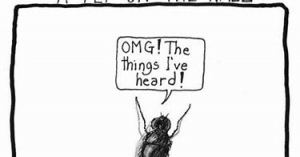I do not claim to be a legal expert, and I don’t even play one on TV. But I do read and watch legal experts, and from what I’ve gathered, Trump’s firing of Jeff Sessions and appointment of Matt Whitaker have created an extraordinarily interesting strategic situation for Robert Mueller and Rod Rosenstein to navigate.
Because both of these men –particularly Mueller, as well as the A-team around him — are quite able, and because I’m finding the strategic challenge (as I understand it) to be so complex, I sure would like to be able to hear these very bright legal minds think through how best to play their cards in order to fulfill their mission of defending the rule of law in America against a President who so regularly abuses his power to place himself above the law.
(BTW, I’m not saying that Mueller and Rosenstein’s position is not a winning one. I’m actually rather hopeful on that score. I would bet that Trump will be unable to protect himself. What I’m saying is that envisioning how this will unfold seems unusually difficult in unusually interesting ways.)
Here are the factors that I believe combine to create the strategic complexity of this moment for the broad, many-faceted Mueller investigation:
- The general consensus seems to be that Sessions was fired, rather than that he resigned. And if that is so, it would seem that there is no legal basis (under the Federal Vacancies Reform Act) for Trump to have named anyone to be Acting Attorney General. What I believe but am not sure is the case is that, because the vacancy was created by a firing, the Deputy Attorney General automatically would rise to become Acting AG, while the next actual AG would have to be nominated by the President and submitted to the Senate for confirmation or rejection.
Which would mean that Whitaker is not really the Acting AG.
- Even if this situation did conform to one in which the President could name an Acting AG of his choice, I’ve heard, Trump would have to select someone who’d already been confirmed for SOMETHING at a senior level by the Senate. Whitaker would not be eligible for such appointment, as he’s never been confirmed for anything.
- Even if Whitaker were eligible to be appointed Acting AG, there seems to be a widespread consensus that he is required to recuse himself from any dealings with the Mueller investigation because of all the ways his past comments show him to have prejudged a whole slew of matters relevant to the investigation. So by that token, his appointment should change nothing concerning that vital Mueller investigation: if Whitaker were to be recused, that investigation it would stay under Rosenstein’s supervision.
- However, that’s not going to happen. Whitaker has given every indication that he will NOT recuse himself. He has certainly not asked the DOJ to provide him with guidance on whether his recusal is required, according to Department policy. And that raises the question of whether the relevant office in the Justice Department (name?) would initiate on its own an inquiry into whether Whitaker is obliged to recuse himself, and then would deliver Whitaker its opinion. But even if Whitaker were judged to be so “obliged,” I gather, he could not be forced to do so. So recusal is presumably not how this Whitaker/Mueller drama will be resolved. But Whitaker’s failure to recuse himself may be a factor that weighs in the picture, further undermining Whitaker’s shaky position.
- If Whitaker’s appointment has been unconstitutional, then what? It was said on Lawrence O’Donnell’s THE LAST WORD that no one in the Justice Department would be obligated to treat orders emanating from Whitaker as binding on them, because Whitaker is not legitimately in that position. That being the case, it was said, the people supposedly under Whitaker could just ignore his orders; or they could contest them in the courts. Which seems to suggest that Rosenstein could just bide his time now and wait until either he was given an order he wanted to disobey, or had something he wanted to do that he did not feel obliged to clear with this illegitimate “Acting AG” and just do it. So does that perhaps mean that if Mueller handed his report to Rosenstein (not to Whitaker, because he knows that Whitaker is not legitimately AG), Rosenstein might just send it to Congress or otherwise make it public without talking to Whitaker (because Whitaker has no legitimate standing)? Or, rather than just going around Whitaker, would any challenge to Whitaker’s legitimate authority come in the form of a legal challenge, contesting his appointment in the Court? But I believe there may be a reason to leave Whitaker sitting there, thinking he’s got the authority, not getting him removed, for the following reason:
- If Whitaker were removed, but Trump’s authority to appoint an Acting AG were not eliminated, then Trump could find someone likely just as bad among all the people that Trump has managed to get confirmed by the Senate. Maybe Mueller and Rosenstein are thinking that Whitaker — with all of the weaknesses of his position — is best left in place at least for the time being.
- Meanwhile, it is generally believed that Mueller is ready or nearly ready to indict some major figures, continuing his work of moving up the line toward the President. Roger Stone and Don Jr. are the face-cards generally thought to be the next ones to be dealt out. How does the new configuration at DOJ, with its new set of ambiguities, affect the strategic decisions regarding the timing of any such moves?
- And then there’s the new factor of the Democrats now having power — including the power to investigate, the power to issue subpoenas — in the House of Representatives. It has been said that whatever anyone does to the Mueller investigation, Mueller’s work is nearly complete, meaning he’s already in a position to say a whole lot. And the Democrats can bring him in as a witness where in answer to questions, Mueller can give testimony before the whole country in which he does indeed say a whole lot, telling us all under oath whatever might have appeared in a report that Mueller would have submitted and that Whitaker might have served his master by burying.
(Wondering: are there any rules — written or unwritten — that would prohibit the truth-seekers on the Justice side and those Democrats in the House — like Adam Schiff, Jerrold Nadler, Elijah Cummings — from conferring together on a coordinated strategy for dealing with the situation they face?)
I expect I’ve left out some important factors that would rightly figure into the strategic thinking of Mueller, his team, and Rosenstein. But these are the main ones that I’m aware of, and believe to be true that would factor into conceptualizing the terrain on which these defenders of the Constitution and the rule of law must make their choices as they battle a President bent on obstructing their efforts to see that justice is done.
And I’m imagining that if I were a fly on the wall — but presumably with a better brain than a fly’s — it would be a pleasure to hear them make their decisions, and map out their contingencies, similar to the pleasure of watching a chess master deploying his pieces.




![Monday News: Trump’s Lunacy Pushes China, Russia, India, etc. Together; “Happy Labor Day. Donald Trump and Elon Musk Are Screwing Workers.”; “Where is the [media’s] intense focus on Trump’s failing health?”; ““Trump says he is not a dictator. Isn’t he?”](https://bluevirginia.us/wp-content/uploads/2025/09/montage0901-238x178.jpg)










![Monday News: Trump’s Lunacy Pushes China, Russia, India, etc. Together; “Happy Labor Day. Donald Trump and Elon Musk Are Screwing Workers.”; “Where is the [media’s] intense focus on Trump’s failing health?”; ““Trump says he is not a dictator. Isn’t he?”](https://bluevirginia.us/wp-content/uploads/2025/09/montage0901-100x75.jpg)